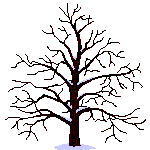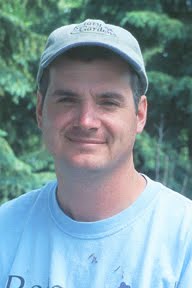 Above is a winter shot from many years ago of the gazebo. A shot today would involve lots of blowing snow. Although the accumulation will only be another 1 to 3 inches throughout the day, winds up to 50 mph have made it a white out at times. My worry is that the bottom layer of slush from last night may already be ice. That will make our path cleanup at RBG challenging but we have until Friday to get everything in order before the lights show opens.
Above is a winter shot from many years ago of the gazebo. A shot today would involve lots of blowing snow. Although the accumulation will only be another 1 to 3 inches throughout the day, winds up to 50 mph have made it a white out at times. My worry is that the bottom layer of slush from last night may already be ice. That will make our path cleanup at RBG challenging but we have until Friday to get everything in order before the lights show opens.I was reading the Seed Savers Exchange 2010 Harvest Publication last night and thought I'd share some interesting factoids. If you haven't researched or been involved with the Seed Savers Exchange (www.seedsavers.org/), I recommend looking in to this wonderful organization that continues to preserve and protect our rich, seed legacy. Since 1975, this non-profit has distributed over 1 million samples of rare garden seeds. RBG has been a member for many years and has obtained seeds thru them as well. Their mission is "to save North America's diverse, but endangered, garden heritage for future generations by building a network of people committed to collecting, conserving and sharing heirloom seeds and plants, while educating people about the value of genetic and cultural diversity." This publication had a recent speech given by Marian Rodale, granddaughter of J.I. Rodale, that is part of her "Organic Manifesto". I haven't read the book (yet) but he new book (2010) is called Organic Manifesto - How Organic Gardening Can Heal the Planet, Feed the World and Keep Us Safe. I intend on reading this book although I know I'll be both horrified and hopeful at the same time based on some of the facts and figures she is sharing about our current, industrial ways of producing food. I'd like to share some of her points from her talk from this Seed Savers event and am sure they are also in the book.
* "We are risking our lives on this planet through our reliance on chemical agriculture, genetic modification of seeds and even our own image of what a lawn or garden or farm should look like and our overuse of synthetic chemicals."
* Approximately 60 million lbs. of organophosphate pesticides are applied to U.S. agricultural crops each year
* Over 80,000 chemicals (4 billion lbs.) are used annually in the U.S. to kill everything from agricultural pests to bacteria in schools
* At least 75% of these manufactured chemicals (that have been tested) are known to cause cancer and are toxic to the human brain at certain levels.
* Synthetic agricultural chemicals and chemical based farming is destroying soils by killing living organisms that help absorb carbon and store it. This soil destruction is contributing to the release of carbon in to the atmosphere (not to mention damaging these soils immensely)
* Chemical companies and the bad government policies they support have trapped our farmers into a cycle of dependency on these chemicals that contributes to the global environmental crisis and our dependence on fossil fuels.
* Organic farming is more productive than chemical agriculture, uses 30% less energy, creates jobs, stores carbon, does not pollute the soil, water, air, our bodies or our future.
* Organic farming can feed the world
While this might be "preaching to the choir", this current cycle (described above) continues to expand not only in agriculture but in our yards and gardens. Just go to any garden center or "box store" and see the wide range of chemicals that is available to instantly address any problem (or potential problem) that you can imagine. Scary times but they can also be hopeful if we get our priorities in order. Healing the planet will be a collective endeavor. Back to a nice day of reading (seed catalogs) by the fire.




No comments:
Post a Comment